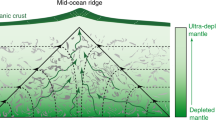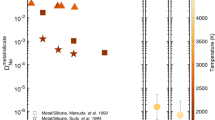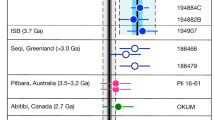Abstract
If the concept of a depleted/undepleted mantle system is valid, rare gas isotopic composition and abundances should be different in continental and plume areas fed from the undepleted mantle than in oceanic glasses fed from a depleted mantle1. Ultramafic inclusions in basalt have been studied in attempts to find examples of undepleted mantle trapped gases2–6. In particular, Kaneoka and Takaoka measured the helium and argon isotopic abundances in olivine nodules and phenocrysts from Hawaiian basalt7. The nodules are characterized by midocean ridge basalt (MORB)-type 40Ar/36Ar and 3He/4He ratios, while the phenocryst data show lower 40Ar/36Ar and higher 3He/4He; these latter data were interpreted to indicate an undepleted mantle source relative to that for the nodules and oceanic tholeiites. I have measured 4He, 40Ar and 36Ar abundances in two Hawaiian ultramafic nodules, and find clear evidence of incomplete retention of mantle gases plus significant atmospheric contamination. Comparison with the previously measured phenocrysts indicates the prevalence of these complications in all such ultramafic samples. Conclusions concerning the nature of the rare gases in the undepleted mantle based on such samples are invalid.
This is a preview of subscription content, access via your institution
Access options
Subscribe to this journal
Receive 51 print issues and online access
$199.00 per year
only $3.90 per issue
Buy this article
- Purchase on Springer Link
- Instant access to full article PDF
Prices may be subject to local taxes which are calculated during checkout
Similar content being viewed by others
References
Fisher, D. E. Phys. Earth planet. Inter. 29, 242–251 (1982).
Hennecke, E. W. & Manuel, O. K. Science 164, 1334–1336 (1971).
Hennecke, E. W. & Manuel, O. K. Nature 257, 778–780 (1975).
Kaneoka, I. & Takaoka, N. Earth planet. Sci. Lett. 39, 382 (1978).
Saito, K., Basu, A. R. & Alexander, E. C. Jr Earth planet. Sci. Lett. 39, 274–280 (1978).
Kaneoka, I., Takaoka, N. & Aoki, K. in Terrestrial Rare Gases (eds Alexander, E. C. Jr & Ozima, M.) 71–83 (Cent. Acad. Publ. Japan, Tokyo, 1978).
Kaneoka, I. & Takaoka, N. Science 208, 1366–1368 (1978).
Dymond, J. & Hogan, L. Earth planet. Sci. Lett. 38, 117–128 (1978).
Takaoka, N. & Nago, K. Nature 276, 491–492 (1978).
Fisher, D. E. Nature 290, 42–44 (1981).
Kyser, T. K. & Rison, W. J. geophys. Res. 87, 5611 (1982).
Fisher, D. E. Nature 282, 825–827 (1979).
Kurz, M. D., Jenkins, W. J., Schilling, J. G. & Hart, S. R. Earth planet. Sci. Lett. 58, 1–14 (1982).
Kurz, M. D. & Jenkins, W. J. Earth planet. Sci. Lett. 53, 41–54 (1981).
Fisher, D. E. Nature 256, 113–114 (1975).
Author information
Authors and Affiliations
Rights and permissions
About this article
Cite this article
Fisher, D. Rare gases from the undepleted mantle?. Nature 305, 298–300 (1983). https://doi.org/10.1038/305298a0
Received:
Accepted:
Issue Date:
DOI: https://doi.org/10.1038/305298a0
This article is cited by
Comments
By submitting a comment you agree to abide by our Terms and Community Guidelines. If you find something abusive or that does not comply with our terms or guidelines please flag it as inappropriate.



